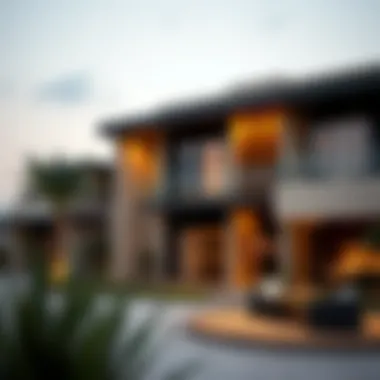Exploring Dubai's Real Estate Market with Better Homes


Intro
Navigating the intricate maze of real estate in Dubai, particularly through the lens of Better Homes Dubai, reveals a world bustling with opportunities. This bustling metropolis, known for its dazzling skyscrapers and luxury lifestyle, is more than just a playground for the wealthy. It presents a wealth of investment options for buyers, renters, and expatriates alike. Here, potential residents and savvy investors can glean insights into the ebbs and flows of the market and discover the unique neighborhoods that add character to this thriving city.
Dubai's real estate market isn't a static entity; it shifts and evolves in response to various local and global factors. What makes this exploration particularly fascinating is how the landscape adapts to meet the needs and aspirations of a diverse populace. From emerging neighborhoods and innovative developments to fluctuating pricing trends, a comprehensive understanding can significantly influence decision-making.
In the sections that follow, we will delve into the current market trends, examine investment opportunities, and uncover valuable lifestyle insights tailored to both prospective homeowners and astute investors. Whether you're looking to plant roots or seek opportunities within this vibrant sector, there's plenty to uncover.
Market Trends
Current Real Estate Pricing
One cannot discuss Dubai's real estate market without touching upon the pricing dynamic that underscores this ever-changing landscape. Various factors, including geopolitical considerations, economic policies, and demographic shifts, play a crucial role in shaping current prices. As of late 2023, the average price per square foot stands at around AED 1,200 in established areas, while more emerging locations can offer square foot prices that are dramatically lower, creating attractive entry points for newcomers.
In recent months, a noticeable trend has emerged—prices in certain neighborhoods like Jumeirah Village Circle (JVC) and Dubai Marina have seen a gradual uptick, suggesting a recovering market amidst global financial fluctuations. Investors keen on grabbing a good deal have turned their eyes to up-and-coming locales like Dubai South and Al Furjan, where apartment pricing provides a fresher canvas to capitalize on.
Emerging Neighborhoods and Developments
The pulse of Dubai’s real estate is often felt through its neighborhoods. Places that were once regarded as peripheral are now at the forefront, attracting not only investors but also families and professionals. Areas like Dubai Hills Estate and Mohammed Bin Rashid City are capturing attention. Large-scale developments like Expo City—a legacy of the 2020 World Expo—have paved the way for diverse residential offerings, commercial spaces, and recreational areas that cater to a modern lifestyle.
Key Emerging Areas to Watch:
- Dubai South: Positioned to host the Expo 2020 legacy, it promises affordable housing and is conveniently located near the upcoming Al Maktoum International Airport.
- Jumeirah Village Circle (JVC): A favorite among renters looking for quality housing, with prices still relatively low compared to neighboring areas.
- Meydan City: Known for its sleek villas and proximity to lush green spaces and racecourses, Meydan City is steadily becoming a sought-after address.
Investors shouldn't overlook these burgeoning neighborhoods; they come packed with potential and often provide higher yields compared to traditional markets.
"The earlier you plant the seed, the faster it will grow."
Investment Opportunities
Short-Term vs Long-Term Investment Strategies
Determining an investment strategy is crucial for anyone looking to dive into Dubai's real estate market. The short-term and long-term approaches each come with their own sets of advantages and challenges. Short-term investors are often looking towards vacation homes and serviced apartments, which have gained traction due to Dubai's tourist influx. However, the long-term investors are eyeing properties in areas projected for growth, driven by infrastructural developments and urban expansion. This strategic insight is particularly valuable in a market as dynamic as Dubai.
Financing and Mortgage Options
Understanding financing options can provide a considerable edge. Financing a property in Dubai has become increasingly accessible for foreign investors. Several local banks offer competitive mortgage products, with some reaching up to 80% financing for select properties. Investors are encouraged to review any off-plan projects, as these often come with flexible payment plans that can assist in smoothing cash flows during the purchase period.
Better Homes Dubai Overview
The real estate sector in Dubai has evolved tremendously over the years, becoming one of the most dynamic and attractive markets in the world. Within this vibrant landscape, Better Homes Dubai emerges as a pivotal player. Understanding this company’s foundation and current offerings is essential for anyone diving into the Dubai property scene. With a reputation forged through years of excellent service and successful transactions, Better Homes is at the forefront of this bustling market, guiding buyers, sellers, and investors alike. This overview sets the stage for a deeper exploration of the realities behind Better Homes, encapsulating its significance, the services it offers, and its standing in the market.
Company History and Development
Founded in the late 1980s, Better Homes Dubai started with a vision to shake up the traditional approach to real estate. Over the years, it has adapted to the ever-changing demands of the market. The growth trajectory has been formidable. In the late '90s, the firm embraced technology, emerging as one of the first companies to leverage online property listings in the UAE. As Dubai transformed into a global city, Better Homes adapted, carving a niche in providing exceptional service and a comprehensive portfolio of residential and commercial properties. Today, it stands as a beacon of reliability in a sea of options, offering insight and guidance to clients who might find themselves steering through unfamiliar waters.
Services Offered
Better Homes provides a wide array of services that cater to various demographics including investors, tenants, and first-time homeowners. Some of the key offerings include:
- Property Sales: Personalized consultations help clients find their dream homes or lucrative investments.
- Rental Services: A thorough understanding of the rental market allows Better Homes to support both landlords and tenants effectively.
- Property Management: Comprehensive management services ensure properties are well-maintained, maximizing value for investors.
- Property Valuation: Expert assessments guide stakeholders in making informed decisions based on current market conditions.
These services are backed by a team of dedicated professionals who combine local expertise with international standards. Each service is crucial for navigating the complexities of the Dubai real estate market, particularly for expats or foreign investors unfamiliar with local regulations.
Reputation in the Market
What sets Better Homes apart in a crowded field? Its reputation is not just built on the volume of transactions, but also on the client-centric approach that fosters trust and long-term relationships. Numerous testimonies from satisfied customers reflect a commitment to excellence. Industry awards and recognitions further solidify its standing. People are often quick to share their experiences with Better Homes, citing the firm’s reliable advice, transparency in dealings, and dedication to client satisfaction.
Furthermore, Better Homes Dubai maintains an active presence online, often engaging with the community through social media platforms like Facebook and real estate forums such as Reddit. This responsiveness to client inquiries and market trends helps build a robust image. It’s as if they’ve mastered the art of balancing traditional real estate wisdom with modern customer engagement – a feat that not all can achieve.
In summary, Better Homes Dubai remains a cornerstone in the real estate market, offering unmatched services while building lasting relationships with its clients.
Understanding the Dubai Real Estate Market
Gaining a clear insight into the Dubai real estate market is crucial for anyone looking to invest, rent, or even just understand the shifting sands of this vibrant city. The market here is not just about properties; it's a living, breathing ecosystem influenced by a multitude of factors. Investors, home buyers, renters, and expatriates alike must grasp the nuances that define this market to make informed decisions. The stakes are often high, given Dubai's reputation for luxurious living and remarkable investments.
Current Market Trends
The real estate scene in Dubai is always evolving, and staying ahead requires awareness of key trends.
- Diverse Property Types: The market offers various housing options, from opulent villas in Palm Jumeirah to more budget-friendly apartments in Al Quoz. This wide range covers just about every lifestyle and financial capacity.
- Strong Demand for Rentals: With expatriates making up a large segment of the population, rental demand continues to be robust, specifically in neighborhoods popular with internationals like Dubai Marina and Downtown Dubai.
- Shift Towards Sustainability: Recently, there's been a noticeable pivot towards eco-friendly developments. Properties that incorporate sustainable practices and green technologies are increasingly sought after.
These trends underscore the necessity of keeping your ear to the ground. Ignoring trends could lead to missed opportunities or, worse, investments that don’t yield expected returns.
Economic Factors Influencing Real Estate


Understanding the economic backdrop of Dubai is vital for evaluating its real estate market.
- Oil Dependency Transition: Once heavily reliant on oil revenues, Dubai is diversifying its economy. Tourism, trade, and finance are now major players, contributing to a more resilient market.
- Expo 2020 Impact: Hosting the World Expo put Dubai on the global map, attracting investors from around the globe. Although the event has passed, its legacy continues, influencing property demand positively.
- Government Initiatives: The Dubai government has launched various initiatives, such as long-term visas and simplified ownership laws for foreign investors, making it easier to move capital into real estate.
These economic elements tie directly into property values and rental rates, making it imperative to monitor them closely.
Impact of Global Events
Global occurrences significantly impact the Dubai real estate market, sometimes in unforeseen ways.
- Pandemic Effects: The COVID-19 situation prompted a buying spree in certain sectors like luxury homes, as people reassessed their living spaces during lockdowns.
- Geopolitical Stability: With the Middle East's ongoing complexity, stability in Dubai often attracts investors looking for a safe haven, thereby driving demand.
- Investment Flows: Events like Brexit and U.S. market volatility have steering effects, pushing foreign investors towards Dubai as a solid alternative.
Each global situation can change the landscape rapidly, and being informed is not just beneficial—it's essential.
"The Dubai market offers a unique blend of local knowledge and global influence, making it a captivating environment for investors."
Investment Opportunities in Dubai
Investment opportunities in Dubai have gained much attention. The emirate's robust economy and strategic position attract a myriad of investors. It's not merely about owning a piece of property; it's about tapping into a thriving market, which promises not just returns but a lifestyle.
A key element driving investment is the diversity of properties available. From luxury apartments overlooking the Burj Khalifa to quaint villas in quieter neighborhoods, options abound. This means no matter your budget or taste, there's something for everyone.
Moreover, the landscape of real estate in Dubai isn't static. It's an ever-evolving market, adapting to global trends and local demands alike. Investors must consider not only the property itself but also how it fits into broader market trends and infrastructure developments.
Types of Properties to Consider
In Dubai, investors can choose from a vast array of property types:
- Luxury Residential Properties: These high-end buildings often come with exclusive amenities like pools, gyms, and concierge services. Such properties tend to cater not just to the affluent local market but also to high-net-worth expatriates.
- Commercial Properties: These spaces are designed for businesses. Investing in commercial real estate can yield higher returns, as businesses look for prime locations to capitalize on foot traffic and brand visibility.
- Mixed-Use Developments: These developments blend residential, commercial, and leisure spaces. They not only offer a vibrant community but also provide investors with multiple streams of income.
- Vacation Rentals: With Dubai being a prime tourist destination, investing in properties for short-term rental can turn a significant profit, especially if positioned close to tourist hotspots.
Emerging Neighborhoods
Emerging neighborhoods present a golden opportunity. Areas such as Dubai Marina are no longer the best-kept secrets; they are undergoing continual growth. However, neighborhoods like Dubai South and Mohammed Bin Rashid City are coming into their own. These areas, previously overlooked, are evolving quickly thanks to vital infrastructure projects and government-led initiatives. Investing in such areas can yield substantial rewards, as property values climb when demand follows.
Consider the potential benefits of investing in up-and-coming areas:
- Lower Entry Costs: Often one can find bargains compared to established zones.
- High Capital Appreciation: As the area develops, property values can skyrocket.
- Strong Community Development: Emerging neighborhoods often have new amenities and services planned which enhance living standards.
Average Returns on Investment
The potential for returns in Dubai's real estate market is compelling. On average, investors can expect a return on investment (ROI) of between 8% to 10%, which is notably attractive compared to many global markets. Some areas push those average returns even higher, especially where competition for rental properties is fierce.
A few factors that might impact ROI include:
- Location: Proximity to business hubs or leisure facilities boosts demand.
- Market Trends: Keeping an eye on urban expansion and planned developments can provide insight into future appreciation.
- Property Management: Efficient management can lead to reduced costs and increased satisfaction among tenants, boosting your rental income.
"Investing in the right property in Dubai can feel like hitting the jackpot, with the right mix of timing and location yielding extraordinary results."
In summary, the various types of properties, the pulse of emerging neighborhoods, and attractive ROIs represent a happy trifecta for savvy investors looking to plant their roots in the Dubai real estate market.
Navigating the Rental Market
In the realm of Dubai's ever-evolving real estate scene, understanding the rental market is crucial for both newcomers and seasoned residents. The rental market isn't just about finding a roof over your head; it's a complex system with various layers that can make a significant difference in one's quality of life. Rental rates may shift like the sands of the desert, thus a solid grasp of the dynamics involved arms potential renters with valuable insights that can help them make informed decisions.
Being in tune with the local rental trends, understanding regulations, and knowing what to look for in lease agreements can save you a bunch of headaches down the road. Moreover, considering lifestyle preferences that match the selected areas enhances your living experience immensely.
Tips for Renters
Navigating the rental market can feel like a wild goose chase if you're not equipped with the right strategies. Here are some tips that can help streamline your search:
- Budget Wisely: Always set a budget before diving into the offerings. This helps you avoid the frustration of falling in love with a place that’s out of your financial reach.
- Use Reputable Platforms: Websites like Better Homes and Dubizzle offer extensive listings. It's like having a treasure map that leads you to your dream abode.
- Visit Multiple Places: Don't settle for the first apartment you see. Being thorough can help you identify the pros and cons of various neighborhoods.
- Be Ready to Negotiate: Landlords may be open to discussions, especially in a market where vacancies are high. Finding common ground can lead to favorable terms.
- Understand the Local Culture: Dubai is a melting pot of cultures, and being aware of local customs when renting can help create a smoother experience.
Regulations and Tenancy Laws
Navigating legal waters can be tricky, but understanding the regulations governing rental agreements in Dubai is paramount. The Dubai Land Department lays down clear rules to protect both landlords and tenants:
- Rental Contracts: These must be registered with the Real Estate Regulatory Agency (RERA). It’s not just about putting pen to paper; this ensures legal protection for both parties involved.
- Notice Period: Typically, a landlord must provide at least 90 days' notice before terminating a tenancy. This ensures that tenants aren’t thrown into unexpected housing crises.
- Rental Rate Increases: Landlords can only raise rent under specific conditions. Checking the RERA's rental index is advisable to see if the increase is justifiable.
"Understanding the rules of the game is half the battle won."
Understanding Lease Agreements
Getting familiar with lease agreements can often feel like trying to decipher a secret code. However, this document is critical for anyone who's renting. Here’s what to pay attention to:
- Duration: Know whether the lease is short-term or long-term. This impacts your flexibility.
- Terms and Conditions: Read the fine print! Hidden clauses can lead to unwanted surprises. They dictate everything from maintenance responsibilities to the consequences of breaking the lease.
- Deposits and Fees: Make sure you know how much is required upfront, and what can be returned upon your departure.
- Amenities and Services: Check what’s included; things like parking spaces, swimming pools, or gym access can greatly affect your quality of life.


By navigating the rental market with a keen eye on regulations and leveraging practical tips, you’ll be better positioned to find a rental that suits your needs and lifestyle. Whether you're an expat settling in or a local seeking a new home, being well-informed is your best ally in Dubai's vibrant real estate environment.
The Role of Technology in Real Estate
In today's fast-paced real estate environment, technology plays a pivotal role, reshaping how business is done and influencing every aspect of the property market. Without a doubt, innovation in this area provides powerful tools for investors, homeowners, renters, and realtors alike. Notably, it streamlines processes, enhances transparency, and improves user experience. This section will delve into three key components: digital platforms, virtual tours, and data analytics, highlighting their significance in the Dubai real estate landscape.
Digital Platforms and Listings
One cannot underestimate the impact of digital platforms in the realm of real estate. Websites and apps like Better Homes Dubai serve as virtual marketplaces where buyers and renters can find properties with just a few clicks. These platforms aggregate listings, enabling users to explore different options without the need for time-consuming visits.
Key benefits include:
- Accessibility: Listings are accessible 24/7 from the comfort of one’s home or on-the-go using mobile devices.
- Comprehensive Information: Property details, high-resolution images, and amenities are all available at the user’s fingertips.
- Comparison Tools: Many platforms allow potential renters or buyers to compare properties side by side, simplifying decision-making.
With listings updated in real-time, users can stay informed about market changes and emerging opportunities. The use of SEO strategies ensures that relevant listings appear prominently in search results, drawing attention to specific neighborhoods and new developments in Dubai.
Virtual Tours and Viewings
Virtual tours have revolutionized how people view properties, especially in a constantly evolving market like Dubai. They offer a compelling alternative to traditional in-person visits, allowing prospective buyers and renters to explore homes as if they were physically there.
The advantages of virtual tours include:
- Convenience: Interested parties can tour several properties in a short time, regardless of geographical constraints.
- Enhanced Experience: They can navigate through a property at their own pace, zooming in on areas of interest and getting a feel for the layout.
- Reducing Physical Visits: Particularly beneficial for expatriates and international buyers, virtual tours reduce travel expenses and time spent commuting.
By integrating 360-degree views and interactive elements, real estate platforms effectively make remote viewings engaging—and effective. This shift also reflects broader trends in consumer expectations, where technology meets the need for speed and efficiency.
Data Analytics in Property Management
Finally, data analytics emerges as a powerful tool in property management, shaping strategies for both realtors and investors. With a wealth of data at their disposal, professionals can make informed decisions based on trends, pricing, and consumer behavior.
Consider these points of interest:
- Market Trends Analysis: Understanding what types of properties are in high demand helps in curating listings that attract potential clients.
- Predictive Analytics: Using past data to predict future trends can guide investment decisions, allowing properties to be acquired or sold at opportune times.
- Enhancing Client Relationships: By leveraging analytics, agents can personalize communication and offer recommendations tailored to specific needs.
As data-driven strategies become more prevalent, property management transitions from a reactive to a proactive approach, enhancing overall efficiency and profitability.
In summary, the role of technology in the real estate landscape is transformative. From online listings to immersive virtual experiences and robust data analytics, it serves to enhance market participation and improve outcomes for all involved. As Dubai continues to attract global attention, staying abreast of these technological advancements will be crucial for navigating the market effectively.
Cultural and Lifestyle Considerations
Dubai's dynamic landscape is not just about towering skyscrapers and luxury properties; it’s also deeply intertwined with its diverse cultural and lifestyle elements. The importance of understanding these considerations cannot be overstated, particularly for investors, expatriates, and anyone looking to settle in this vibrant city. Recognizing local customs, social norms, and community preferences can significantly impact the residential experience, often swaying decisions about where to live or what type of property to invest in.
Lifestyle Preferences by Region
Dubai’s regions boast unique charm and distinct lifestyle choices that cater to various demographics. Each neighborhood has its flavor—some aligned with traditional values and others embracing a more modern lifestyle.
- Downtown Dubai attracts those who strive for the fast-paced urban life, encompassing the lavish lifestyle with malls, hotels, and art galleries at their fingertips.
- Jumeirah is synonymous with a beachy lifestyle; here, you’ll find families basking in the sun, enjoying parks and beachfront activities.
- Dubai Marina, with its modern apartments and vibrant nightlife, is popular among young professionals and expatriates looking for social engagement and convenience.
- Old Dubai, including areas like Deira and Bur Dubai, showcases a rich heritage. It draws in those who appreciate the authenticity and cultural experiences—bustling souks and traditional markets are the lifeblood of this area.
Thus, understanding these preferences helps investors tailor their approach to potential buyers or renters by matching them with properties that suit their lifestyle.
Community Amenities and Services
Amenities and services play a pivotal role in shaping the community experience. The varying degrees of facilities offered can easily be the deal-breaker for many. For instance, families might prioritize educational institutions, while young singles might look for entertainment options. Here are several features that are commonly sought after:
- Parks and Recreational Areas: Many neighborhoods in Dubai, like Al Barsha, offer parks where families can enjoy picnics and kids can play safely.
- Shopping Centers: Places like The Mall of the Emirates and Dubai Mall provide not just shopping but also dining and entertainment, which are crucial for a fulfilling lifestyle.
- Healthcare Services: Proximity to quality healthcare facilities is immensely important, especially for families. Regions with accessible hospitals and clinics tend to be favored.
- Cultural Spots: Residents often appreciate proximity to cultural hotspots—like museums and art centers—fostering a rich sense of community.
Having these amenities close by not only enhances the quality of life but significantly increases property values, making it imperative for investors to consider.
Living in Dubai: An Expat’s View
The expat population in Dubai is a substantial part of its cultural fabric, contributing to a rich tapestry of lifestyles and community dynamics. Those who relocate here often share similar experiences, and their perspectives provide valuable insights into living in this city.
"Living in Dubai feels like an eternal vacation. The blend of modernity with cultural heritage is something unique. Yet, one must consider the local customs carefully, or you might find yourself in a real pickle."
Expatriates commonly notice several aspects:
- Networking Opportunities: Meeting people from all walks of life can be both exciting and beneficial, leading to potential business partnerships and lifelong friendships.
- Varying Cultural Practices: While Dubai is largely modern, retaining respect for traditional customs is essential. This includes dress codes in public spaces and understanding the cultural significance of local holidays.
- Integration vs. Isolation: Some expats feel welcomed, while others find it hard to connect. Engaging in community events and activities can make living here more rewarding.
Sustainability in Dubai Real Estate
The pursuit of sustainability in real estate is not just a trend; it is a pressing necessity, especially in dynamic markets like Dubai. This segment of the real estate landscape emphasizes the vital role that sustainability plays across various projects, and how it can boost property value while also promoting environmental stewardship.
Green Building Initiatives
In Dubai, green building initiatives have gained significant traction. The government has laid out guidelines and incentives for developers to use sustainable materials and technologies. This includes energy-efficient designs, water-saving fixtures, and renewable energy sources like solar panels. Notably, the Dubai Green Building Code requires new buildings to meet specific environmental standards. Moreover, innovations such as smart energy management systems in buildings significantly reduce carbon footprints. This isn't just beneficial for the environment;


- Reduced utility costs: Homeowners and businesses save money over time.
- Increased property value: Homes with green certifications often see higher resale values, appealing to a growing market of environmentally conscious buyers.
As you can see, going green isn't merely a buzzword; it's practically a pathway to sustainability and economic viability.
Sustainable Communities
Sustainable communities in Dubai present another key pillar of a more ecological future. These developments are designed not just with individual homes in mind, but the holistic experience of living within the community. They feature pedestrian-friendly pathways, parks, and transportation options that minimize reliance on cars.
Creating neighborhoods centered around sustainability fosters a sense of belonging among residents and helps conserve resources. For example, communities like Jumeirah Village Circle and Sustainable City have focused on:
- Community gardens: These not only provide fresh produce but also create social spaces for residents.
- Shared facilities: Designed to minimize waste, such as shared pools and recreational spaces.
- Transportation options: Biking paths encourage healthy habits while reducing emissions.
Such initiatives encourage a lifestyle that values not only individual well-being but also community health.
Future of Eco-Friendly Developments
Looking ahead, the future of eco-friendly developments in Dubai is unquestionably bright. With ongoing urbanization, the demand for sustainable options is only expected to grow. Developers must think creatively about how they design and construct homes to address environmental concerns while also attracting buyers.
The potential for eco-certifications is expanding, and developers who invest in such certifications can stand out in a competitive market. Technologies like building information modeling (BIM) allow for better planning and execution of sustainable concepts. In addition to living spaces, plans for eco-friendly commercial projects are on the rise, shaping a lasting impact on how Dubai grows.
Regulatory Framework Governing Real Estate
The regulatory framework governing real estate in Dubai plays a crucial role in shaping the dynamics of investment and property management in this rapidly evolving market. A well-defined set of laws and regulations not only provides clarity for investors and homeowners but also ensures a level of protection that sustains buyer confidence and market integrity. Understanding these frameworks is essential for anyone looking to navigate the complexities of Dubai's real estate landscape.
Real Estate Laws in Dubai
Dubai’s legal system regarding real estate is structured on several key laws and regulations that guide property transactions and ownership. The most notable among these is the Real Estate Regulatory Agency (RERA) Law, which outlines the rights and responsibilities of landlords, tenants, and developers alike.
In practice, this law governs a myriad of issues, among them:
- Property Registration: It mandates that all properties must be registered with the Dubai Land Department to ensure legal ownership.
- Tenancy Laws: It stipulates the rights of tenants, including the duration of leases and conditions under which landlords can terminate agreements.
- Dispute Resolution: Establishes a framework for resolving disputes that may arise between parties, typically through mediation or referral to the Real Estate Court.
In essence, these laws form the bedrock upon which real estate transactions are conducted, helping to create a secure and transparent environment for all stakeholders.
Role of Real Estate Regulatory Agency
The Real Estate Regulatory Agency (RERA) serves as a guiding force within Dubai's property market. Established in 2007, RERA operates under the umbrella of the Dubai Land Department and is tasked with the responsibility of overseeing real estate activities throughout the emirate. Its influence extends into various areas including:
- Regulating Developers: RERA ensures that developers adhere to codified standards in project delivery and sales practices, helping to maintain quality in the market.
- Licensing Real Estate Professionals: It oversees the certification and registration processes for real estate agents and brokerages, ensuring only qualified professionals engage in the market.
- Creating Transparency: One of RERA's strategic goals is to provide accessible information about real estate projects, thus empowering investors with the knowledge they need to make informed decisions.
RERA establishes itself not only as a regulatory body but also as an advocate for fair practices and transparency in the real estate sector.
Property Ownership Rights for Foreigners
A standout feature of the Dubai real estate market is the opportunity for foreign nationals to own property. Unlike in many regions where stringent restrictions apply, Dubai allows foreigners to purchase real estate in designated areas known as freehold zones. This framework opens avenues for:
- Investment Opportunities: Foreign ownership fosters a competitive investment landscape, making Dubai an attractive location for expatriates and global investors.
- Repatriation of Profits: Foreign owners may repatriate their capital and profits without any restrictions, which is a significant consideration for investors.
- Residency Visas: Purchasing property of a certain value often entitles the owner to apply for residency visas, integrating them even further into the vibrant Dubai lifestyle.
Understanding the intricacies of property ownership laws can significantly impact not only investment decisions but also lifestyle planning when moving to Dubai.
Navigating the regulatory landscape around real estate in Dubai is as vital as the physical properties themselves. By grasping the legal nuances, roles of regulatory bodies, and ownership rights, investors, homeowners, and renters alike can set themselves up for success in this sprawling marketplace.
Future Projections for the Market
As the real estate scene in Dubai continues to captivate both local and international investors, understanding the future of this market is essential. The trends, challenges, and anticipated hotspots will shape not just the landscape of property investment but also the experiences of homeowners, renters, and expatriates alike. By gaining insights into future projections, investors can make informed decisions that align with their goals, leading to more significant returns and a clearer understanding of market dynamics.
Anticipated Trends in Property Development
Dubai is often viewed as a jewel of innovation in the real estate sector. Over the next decade, property development is expected to follow some key trends:
- Sustainable Housing: As global awareness about environmental issues grows, developers are likely to focus on eco-friendly buildings that minimize their carbon footprints. Projects that emphasize energy efficiency and the use of sustainable materials stand to gain popularity.
- Smart Homes: With advancements in technology, smart homes, equipped with automated systems for lighting, security, and energy management, are emerging as desirable property features. This trend aligns with the rising expectation for convenience and efficiency.
- Mixed-Use Spaces: There’s a growing urban trend of mixed-use developments, combining residential, commercial, and recreational spaces. This type of development satisfies the demand for vibrant, inclusive communities, enhancing the quality of life for residents.
These trends highlight a shift towards meeting the evolving preferences of today's buyers and renters. If developers can read the tea leaves accurately, aligning projects with these trends could result in successful investments.
Investment Hotspots Over the Next Decade
By analyzing current patterns, we can identify several potential hotspots that could define the Dubai real estate market in the coming years:
- Dubai Marina: This iconic area is not just popular for its waterfront views but also for its luxurious lifestyle. As developments continue, it is likely to attract high-end investors and expatriates looking for a vibrant community.
- Dubai Creek Harbour: Positioned as a new urban space, this neighborhood combines nature and urban living. As major projects unfold here, it stands out as a promising opportunity for buyers looking to invest in the future of Dubai.
- Jumeirah Village Circle: With its affordability and growing amenities, JVC is drawing a younger demographic—especially those new to Dubai. It’s an ideal spot for rental properties, ensuring stable yields for landlords looking to build portfolios.
These communities are spotlighted for their respective attributes, and keeping an eye on their growth will be crucial for astute investors.
Challenges Facing the Real Estate Market
While optimism abounds, the road ahead isn't without its bumps. Here are some challenges that may affect market dynamics in Dubai:
- Regulatory Changes: Keeping up with evolving regulations can be tricky for investors. New policies can impact property ownership, rental regulations, and taxation, which may affect overall profitability.
- Market Saturation: With many new projects in development, there lies a risk of oversupply. An influx of properties might lead to price drops, which can deter new investment and financial returns for existing owners.
- Global Economic Concerns: Factors beyond Dubai's borders, such as global economic downturns or shifts in foreign investment habits, can affect buyer confidence and overall market stability.
"The future of Dubai's real estate market will undoubtedly be shaped by both local trends and global events, making it crucial for investors to remain vigilant and adaptable."
Navigating these challenges requires a comprehensive understanding of the market and continuous monitoring of trends. No landscape is without hurdles, but those equipped with knowledge will always find a path to success.



